- News
- Reviews
- Bikes
- Accessories
- Accessories - misc
- Computer mounts
- Bags
- Bar ends
- Bike bags & cases
- Bottle cages
- Bottles
- Cameras
- Car racks
- Child seats
- Computers
- Glasses
- GPS units
- Helmets
- Lights - front
- Lights - rear
- Lights - sets
- Locks
- Mirrors
- Mudguards
- Racks
- Pumps & CO2 inflators
- Puncture kits
- Reflectives
- Smart watches
- Stands and racks
- Trailers
- Clothing
- Components
- Bar tape & grips
- Bottom brackets
- Brake & gear cables
- Brake & STI levers
- Brake pads & spares
- Brakes
- Cassettes & freewheels
- Chains
- Chainsets & chainrings
- Derailleurs - front
- Derailleurs - rear
- Forks
- Gear levers & shifters
- Groupsets
- Handlebars & extensions
- Headsets
- Hubs
- Inner tubes
- Pedals
- Quick releases & skewers
- Saddles
- Seatposts
- Stems
- Wheels
- Tyres
- Health, fitness and nutrition
- Tools and workshop
- Miscellaneous
- Cross country mountain bikes
- Tubeless valves
- Buyers Guides
- Features
- Forum
- Recommends
- Podcast
review
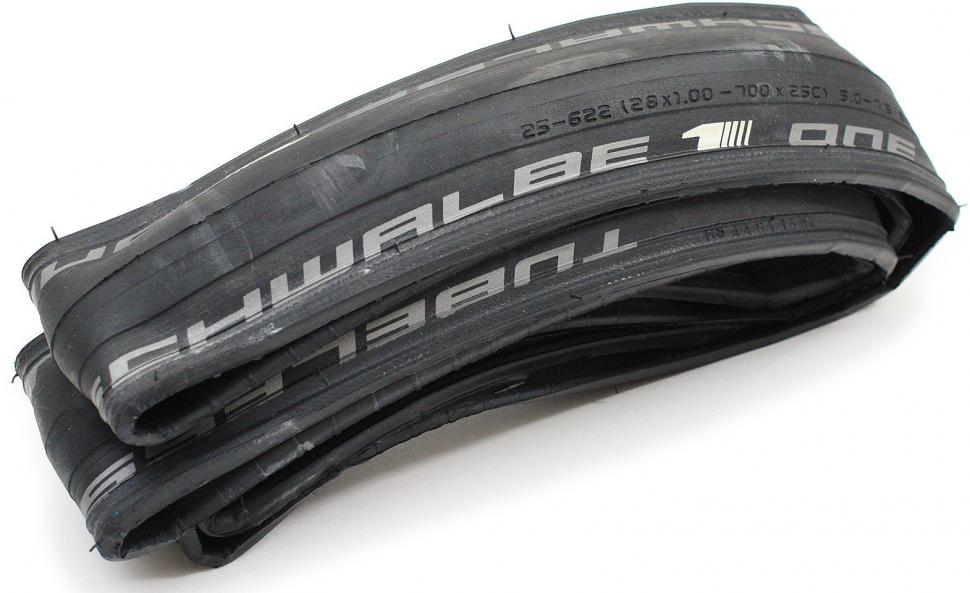 Schwalbe One Tubeless
Schwalbe One Tubeless£56.99
VERDICT:
Schwalbe's racing tyre with all the benefits of tubeless technology plus enough durability for everyday riding
Weight:
634g
Contact:
At road.cc every product is thoroughly tested for as long as it takes to get a proper insight into how well it works. Our reviewers are experienced cyclists that we trust to be objective. While we strive to ensure that opinions expressed are backed up by facts, reviews are by their nature an informed opinion, not a definitive verdict. We don't intentionally try to break anything (except locks) but we do try to look for weak points in any design. The overall score is not just an average of the other scores: it reflects both a product's function and value – with value determined by how a product compares with items of similar spec, quality, and price.
What the road.cc scores meanGood scores are more common than bad, because fortunately good products are more common than bad.
- Exceptional
- Excellent
- Very Good
- Good
- Quite good
- Average
- Not so good
- Poor
- Bad
- Appalling
German tyre company Schwalbe has been a proponent of tubeless road tyres since the release of the excellent Ultremo ZX tubeless tyre I tested two years ago. Those tyres have now been replaced by the new One Tubeless, which takes the company's top-end race tyre and offers it with a tubeless bead. And the result is a very fast and supple tyre with all the benefits from ditching the inner tube, fewer flats.
Find your local dealer here
Buy this online here
Setting the tyre up was easy. I used Stan's new Grail wheelset, a wide profile rim, with the tubeless tape and valve already installed. I simply fitted the tyres, poured in a small amount of latex, and inflated the tyre using a track pump. The tyre popped up onto the rim first time, with the reassuring pop sounds indicating the bead has locked into the rim securely. When tubeless installation is this easy you wonder why everyone doesn't run tubeless, but I know some tyre/wheel combinations can be a little less straightforward. Another member of the road.cc team found it somewhat harder getting one on to a Shimano XT 29er rim, but he also said it was a struggle getting anything on to those - these Schwalbes were by no means the hardest he'd fitted on them.
Schwalbe offers the One Tubeless tyre in a number of width options, right up to 28mm. I chose the 25mm, a popular size these days. I experimented with pressures during the first few rides, in the end settling on about 90-95psi for my 66kg weight, going lower or higher depending on conditions. Being able to run lower pressures is one of the benefits of tubeless - there is no tube to pinch if you hit a hole or crack in the road, so you can safely get away with lower pressures.
The tyre feels very similar to the regular One clincher tyre, with the same grippy yet fast rolling tread compound used across the top of the carcass. The tubeless variant has a wonderfully supple feel on the road surface, tracking the contours of rough roads really well. The tread compound is very durable too, impressive considering it's pitched as a race tyre. It doesn't cut up at all, and even after some of my off-road excursions down bridleways and along the Fosse Way they show no signs of damage. I wouldn't venture off-road on a regular inner tube setup for fear of puncturing, but with tubeless you certainly can do, and these new One tyres, despite being designed for racing, provide impressive durability.
Schwalbe says it has spent three years developing these new tyres and proudly declares the One to be its fastest tyre in its promotional material, saying the rolling resistance of its tubeless tyre is less than an ultralight racing tyre with an inner tube. It's tricky testing rolling resistance in the real world and getting accurate data, but they certainly don't feel slow compared to the regular One tubed tyres when tested on the same bike, on the same roads, in the same conditions. The tyre is substantially heavier, 318g for the 25mm tyres tested, but remember you're losing the weight of the inner tube.
Finally, let's look at the price - £56.99 is a lot of money for a tyre. Tubeless tyres tend to be more expensive than conventional ones - of course you are going to be saving on regularly shelling out for inner tubes not to mention the time and inconvenience caused by punctures. That said, the Schwalbe One is at the uppper end of the scale even for tubeless tyres. In its defence it is a tubeless race tyre and it's also the best riding tubeless tyre we've tested - even better than it's predecessor the Ultremo ZX. It's also worth stressing that £56.99 is merely the rrp, shop around and you can find this tyre for considerably less than that.
With such easy tubeless installation as this, zero maintenance and no punctures, fantastic rolling resistance at lower pressures, fast enough for racing and durable enough for everyday riding with the toughness to tackle more adventurous roads and trails, I'm not sure why I would ever go back to regular tyres with inner tubes. If you're fed up with punctures and have tubeless ready rims (as many new bikes do these days) Schwalbe's One tyres are a good buy.
Verdict
Schwalbe's racing tyre with all the benefits of tubeless technology plus enough durability for everyday riding
road.cc test report
Make and model: Schwalbe One Tubeless
Size tested: 25-622 700x25c - weight is for pair
Tell us what the product is for, and who it's aimed at. What do the manufacturers say about it? How does that compare to your own feelings about it?
This is what Schwalbe say...
Tubeless on the racing bike – the idea as such is not new. Theoretically, there are advantages. But are there also practical ones? Is the tubeless worthwhile in training and competition?
We say Yes. We are absolutely convinced that TUBELESS is the right choice for the racing bike. It is the path into the future
THE MOST IMPORTANT ADVANTAGES OF THE TUBELESS:
Advantage 1: Schwalbe ONE Tubeless is our fastest!
Normally there are two components. Tube and tire are constantly deformed. These flexing movements result in a loss of energy and increase the rolling resistance. If the tube is dispensed with, these negative factors are considerably reduced.
Result: Due to its design principle, the Schwalbe ONE Tubeless is significantly faster! In a direct comparison, the rolling resistance of tubeless tires is, in fact, less than that of a ultralight racing tire.
Advantage 2: Goodbye blowouts
Tubeless tires offer more safety: In case of a puncture, the air does not escape suddenly, but slowly. The crash risk is also distinctly minimized. And no more tubes mean no more tube blowouts. A vital increase in safety for extremely dangerous tube blowouts (e.g., through overheating on long, steep descents, or valves shearing off) are excluded as well.
Advantage 3: Puncture risk virtually zero – with liquid sealant
The Schwalbe ONE Tubeless is seated firmly and tightly. However, we recommend also using our liquid latex sealant DocBlue Professional. For this active puncture protection system functions just as well in racing bike tires as it does in the case of mountain bikes. Virtually all defects are immediately sealed again. Only really serious damage (such as cuts) can still delay the ride.
And what about the weight? The tubeless tire weighs more than a folding tire (tubeless, 305 g / folding tire, 205 g). But there is no tube. If the weight of a standard tube is deducted, the weight of the tubeless is, in principle, identical.
Advantage 4: Less pressure. More performance.
The TUBELESS tire reaches its peak performance with less pressure (1 bar less than normal folding tires). This means improved rolling behaviour, better cornering grip and very good traction. And the rolling resistance remains just as excellent as that of a lightweight racing tire.
Tell us some more about the technical aspects of the product?
Schwables fastest and at the same time most reliable competition tyre
Manufactured in a separate facility built exclusively for the production of this new tyre
Schwalbe One has been used RadioShack Leopard Trek, AG2R and FDJ
Tubeless compatible bead and casing
Available in 700 x 23, 25, 28c
Weighs: 205g - 340g
Evolution line
OneStar triple tyre compound
Folding tyre
Max PSI ratings: 70 - 125 PSI
Rate the product for quality of construction:
9/10
Rate the product for performance:
9/10
Rate the product for durability:
9/10
Rate the product for weight, if applicable:
8/10
Rate the product for comfort, if applicable:
9/10
Rate the product for value:
7/10
Tell us what you particularly liked about the product
Not slower than the regular clincher version with all the benefits of tubeless (lower pressures for more traction and no flats)
Tell us what you particularly disliked about the product
I didn't find anything to dislike during my test with them. You can't change tyres as easily and quickly with tubeless, but these are good enough to fit-and-forget
Did you enjoy using the product? Yes
Would you consider buying the product? Yes
Would you recommend the product to a friend? Yes
Anything further to say about the product in conclusion?
With such easy tubeless installation as this, zero maintenance and no punctures, and fantastic rolling resistance at lower pressures, I'm not sure why I would ever go back to regular tyres with inner tubes.
About the tester
Age: 31 Height: 180 Weight: 67
I usually ride: My best bike is:
I've been riding for: 10-20 years I ride: Every day I would class myself as: Expert
I regularly do the following types of riding: road racing, time trialling, cyclo cross, commuting, touring, mtb,
David worked on the road.cc tech team from 2012-2020. Previously he was editor of Bikemagic.com and before that staff writer at RCUK. He's a seasoned cyclist of all disciplines, from road to mountain biking, touring to cyclo-cross, he only wishes he had time to ride them all. He's mildly competitive, though he'll never admit it, and is a frequent road racer but is too lazy to do really well. He currently resides in the Cotswolds, and you can now find him over on his own YouTube channel David Arthur - Just Ride Bikes.
Latest Comments
- mdavidford 5 min 52 sec ago
It's incorrect in classic formal English, but a perfectly acceptable construction in many forms of spoken English (increasingly so, to the point...
- Drinfinity 27 min 2 sec ago
That corner round the back of the cinema catches riders out in pretty much every race. The pavement there is also fairly narrow, and not barriered,...
- mctrials23 27 min 5 sec ago
Is your curb dropped? No, then you don't have a driveway and if a cycle lane is build past your house then tough luck. The rules on dropping curbs...
- Rendel Harris 30 min 48 sec ago
You could argue that either way but it seems reasonable to call it two separate incidents, he was assaulted, went home, later went back to the...
- ubercurmudgeon 2 hours 19 min ago
What a shit world we've created.
- Freddy56 2 hours 48 min ago
....or just buy galibier's Barrier glove and you don't need 2 pair of gloves. I think mine are 5 winters old.
- HollisJ 4 hours 15 min ago
Probably better suited as an all-road wheelset - the internal width of 22mm is kind of narrow for a gravel wheel these days, where the standard is...
- Miller 5 hours 19 min ago
If I was a DS I'd be lambasting Bettiol for being defeatist but as a spectator, his view seems pretty realistic. Anyway I want Pogi to stay out of...
- wtjs 5 hours 54 min ago
I hope this outcome brings some form of closure for Roseanne’s wider family and my thoughts very much remain with them today...
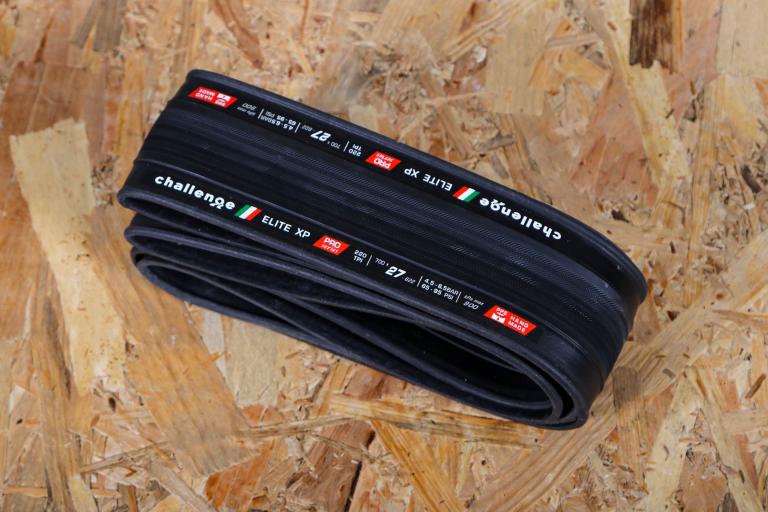
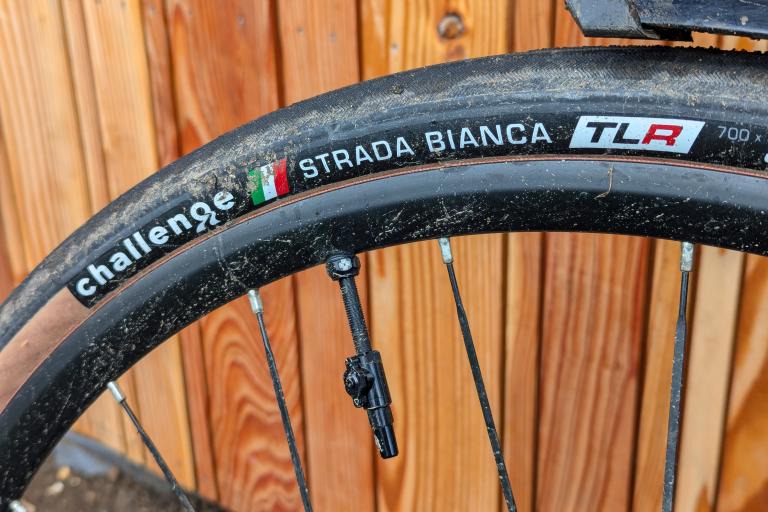
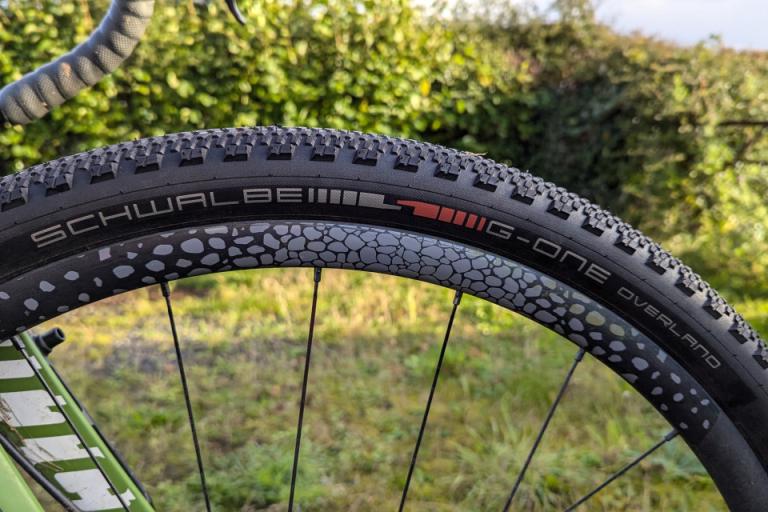
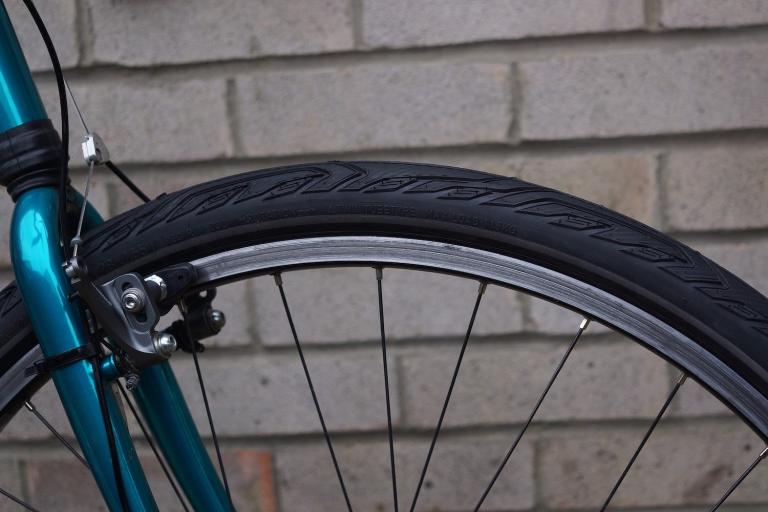
Add new comment
44 comments
Impressive tyre and if these are the easy one's to fit then I'm not trying the hard version
Hate flat's and run tubular tufoS33 pro's all year with sealant on my superstar rims, Converting my carbon rims to tubeless makes the bike look faster already!!
they ride nice and I like the idea of no blow outs, The burway downhill killed a tube after the brakes over heated the rim, scary so hope next visit this is the CURE.
nice review
Despite the fact that some people are apparently blessed enough never to get punctures, there's clearly a market for better puncture protection without hurting ride quality or performance. I like wide tubeless tyres because it gives me the freedom to ride on some of the rougher stuff that I'd just not risk with clinchers. That being the case, these are not the tyres for me. I've been running a Sector 28 up front with no problems and the 28 version of this on the rear with multiple punctures, one of which blew out a quite spectacular cloud of latex as I was trundling down the high street. The tyre on inspection has multiple gashes in the rubber and although it did reseal in the end, it doesn't look safe. Not necessarily a bad tyre - perhaps it's because I'm rougher on these than the manufacturer intended, so next up I'll try the Schwalbe s-one in a 30.
I have ordered the One Pro in 28mm to see how they perform compared to my 25mm One version. The Pro 28mm is lighter than the old 25mm version. Just to see how they feel and roll will be interesting
i fitted these (28mm) and within 150 k commuting in London (2 weeks) I've had to fit tyre boots to both tyres following punctures that didn't seal . The actual blows were pretty small. Perhaps I need a higher pressure sealant (running 75 psi)
Maybe bad luck but generally on commutes I doubt I suffer more than 2 punctures a year. Let us know how you get on.
They feel great though when they're not leaking air and sealant!
After a year on tubeless, I'm going back to clinchers with inner tube. I didn't see any benefits from using tubeless. Clinchers are tried and tested teshnology with wast choice of easy swappable tyres. Clinchers will give me peace of mind in knowing that I will be able to repair them (in 99% of cases) and carry on.
I've been running these tyres in 23 and 25mm versions for the last 18months.
I've races, trained and mucked about on them for 16000km. 0 punctures that didn't seal within 5 seconds or so.
I lost one tyre to a big cut from broken glass, it was about 15mm long and I don't think any tyre would have survived.
I won't ever go back to tubes.
I have run Continental 4 seasons 28mm with inner tubes at 90 psi front 95 psi back for 4 years over badly maintained roads, covering abt 5000 km (weekends only). Zero punctures. Very little wear. I am now swapping them out for Continental GP 28 mm, just for a change. Tubeless? Yes! The technology will eventually displace innner tubes and make it possible to ride lightweight adventure bikes with thru-axles and 40mm tires at 50? psi on gravel, 80 psi on tarmac.
I've now done 50 miles on these exact tyres and can give a subjective view on their 'feel'. I run Conti Grand Prix GT on my other bike and the difference is noticable.
The One is an extremely fast tyre, rolling resistance is amazing. The difference is that you CAN feel the thicker rubber. If I had to describe the top Conti's as having a 'creamy' smoothness to the ride, I'd describe the smoothness of the Ones as 'rubbery' smoothness.
Both very fast tyres but the Ones feel faster but 'rubberier'. A subjective view certainly but quite accurate I feel.
I run these babies and am very happy with them, comfort, speed and puncture wise.
One of the advantages of tubeless is that they can be run at lower pressures but, I have found, if using at say anything between 80 & 90 psi (I am 71kg), the rear really feels like it is going to come off the rim when stomping up short climbs.
I haven't actually had the tyre come off but now run the tyre at above 100psi if I am going to be pushing hard and it feels a lot better in that respect although a harsher ride in general.
Please can you change the weight info from 205g - 340g to 305g - 385g
Weights for tubeless Schwalbe ONE, from 2 of their websites:
23mm - 305g
25mm - 340g
28mm - 385g
Interestingly, my new Hunt wheels pre-fitted with these tyres arrived a couple of days ago. So far I'm very impressed, they're fast and grippy and the thought that I'm a lot less likely to suffer a hawthorn induced puncture is always pleasantly at the back of my mind.
Of Rix's question above, I'd go for option 1.
Here is a real world scenario... Yesterday race was held partially on dirt road where I hit a large stone at 45 kmh. I got "snake bite" puncture, two 5mm holes on inner tube, and tire (Scwalbe One 28mm clincher) had two small holes on one side. It took me 10 min to swap inner tube and continue race.
What is most likely outcome if I had raced on my 25 mm tubeless One's?
a) I would not get puncture because tubeless tire is thicker.
b) I would get puncture but sealant would seal the hole.
c) I would get puncture and need to add more sealant and air to the tire for it to seal properly.
d) It would not seal because the hole is too big.
e) It would not seal because there are two holes and it is impossible to position wheel so that sealant flows to both of them.
I could not find any articles describing One's puncturing.
Any experiences? Suggestions?
Irc roadlite tubeless seem much better than ONE.....
http://whosatthewheel.com/2015/05/19/fleet-moss-and-a-pair-of-irc-roadli...
Just can't get hold of a pair, might try and pick some up in Japan this summer
Please pick up two pairs
I live in Tokyo. I just checked - the 25mm training versions are on Amazon.co.jp (http://www.amazon.co.jp/ROADLITE-TUBELESS-700%C3%9725c-190118-%E3%83%96%E3%83%A9%E3%83%83%E3%82%AF/dp/B009AOSNKG/ref=sr_1_5?ie=UTF8&qid=1449215243&sr=8-5&keywords=Irc+roadlite ) which is partially in English (enough for you to enter your details and and pay for the order).
And here are the Pro version -
http://www.amazon.co.jp/Formula-TUBELESS-RBCC-700%C3%9725c-190121/dp/B00MFC55P6/ref=sr_1_3?ie=UTF8&qid=1449216768&sr=8-3&keywords=Irc+pro+tubeless
I've used both tyres, the IRC are manufactured perfectly and I would prefer them.. Alex's bike shop in Japan will post them. I couldn't find an EU source.
Rode the Somerset 100 last Sunday on the 25mm version of these tyres and thought they were super-plush and super-fast. Had no trouble whatsoever fitting them by hand on some new £200 wheels built in Nottingham by Raleigh ( Alex 'tubeless' rims on Chosen hubs ) using 21mm Stans tape and Slime Pro sealant. I ran them both at 95psi but given the recommendations here I'll experiment with lower pressures. I suspect after a few years we'll wonder how we ever did it different.
I don't ride near any flinty areas, nor are there many thorny hedges. I do ride a fair bit on Northern streets with their usual Saturday morning broken glass. I religiously carry two tubes, a CO2 canister and a mini pump to ward off evil spirits though.
Our cattle grids are taken at 5mph or at 45mph; on t'moors...
This is the key:
"Properly inflated tyres, not running them down to the carcass, and above all, looking where you are riding, ie, not in the gutter will see you right."
I'm not that sure that pinch flats are an issue on a road bike; I've had 2 in 25 years because I rode through a puddle without looking. Punctures? maybe 1 a year in a bad year.
Properly inflated tyres, not running them down to the carcass, and above all, looking where you are riding, ie, not in the gutter will see you right.
The performance advantages seem over-rated, so I'll not be a faffing.
Ladies and Gentleman... With that few punctures, it is safe to day that Crikey clearly does not live in the New Forest. Cattle grids and little bits of flint are the bane of any club run in the winter.
...either that, or his superiority prevent him from the misfortune.
I'm not sure Crikey is such a lucky bloke, his experience pretty much tallies with mine.
I'm still running Ultremos - not the tubeless type - and I've suffered one flat in over 2 years. And yes, I do occasionally ride in the New Forest and cattle grids are par for the course round here.
The trick is to buy really good tyres and not trust to luck with anything less. Where tyres are concerned I believe it's a case of getting what you pay for.
I've had two pinch flats on my road bike in 9 years. One on a pothole (that also damaged my rim) and one when I hit a piece of dry walling stone that fell from a van!
I agree that they aren't a problem for road riding. Now cyclocross, that's a different matter (but I am not sure tubeless is great for that either as there are lots of stories about tyres 'burping' during races)
It's an issue, just not a big one. I've had a couple of pinch flats the last couple of years, both in potholes that i'd missed as they appeared from under the vehicle in front. Punctures - none in a good year, a 2-3 in a bad one. So not much, but the punctures have typically been on the way into/from work when I commuted and so a pain time-wise and (no surprise) in crap weather. The year I was running tubeless for the commute I noticed about 3-4 white pin heads on the tyre - so they represent saved time and faffing for me.
If by 'properly' you mean pumped up high enough to prevent pinch flats then of course that would help - I wouldn't have tyres that high myself as I prefer them pressurised for comfort, compliance and grip rather than pinch prevention. Pinch flats are also affected by the tyre to rim width ratio.
As for the rest, well of course they are sensible precautions but i've had no punctures due to wear and very few from being near the kerb (never 'in the gutter'). I have got them from going on single track and back lanes, through some urban waste-land type locations and generally arsing about not on tarmac - I could avoid doing stuff like that by why on earth would I ? In those situations, especially mucking about on gravel and back-lanes, tubeless can be very handy... and you know what, i've had the odd puncture that just seems like shit luck. YMMV.
Just to clarify, I run tubed clinchers as well, exclusively for the last year or so (one puncture in that time, pinch flat on the old bike, and none on the best bike) and don't have a problem with them - generally more supple is the one difference I see but that's between Hutchinson Fusion 3 (tubeless) and Vedrestein Fortezza Tricomp / Vittoria Open Pave/Corsa CX.
There's not much performance advantage i've seen, and the more theoretical ones are small. That said, they have a place and really aren't the faff people think IME. You're happy with what you ride, I am too - all is well.
Latex inner tubes solved that problem for me. I ran my 28mm clinchers at low pressure. After taking out latex inner tube I could clearly see where inner tube (at least 10% along rim) was pinched between carcass and rim but it never went flat.
FYI I used Challenge cross latex tube
Never happened to me either, I think it might be one of those urban myths that cyclists use to justify buying something else.
All this talk of inner tube blowouts and frequently buying replacements, why does that not happen to me?
It makes me wonder whether tubeless tyre technology some kind of solution looking for a problem.
Increased resistance to pinch flats and punctures - that's what they're a good for. For me, they are a real world problem for which tubeless can be a solution. If neither of those bother you, then there's not much benefit to you.
I'm running the 28c version. About £50 the pair from Germany. Topped up with Stan's sealant. On Pacenti SL25 rims. Excellent. Super comfy and very fast. Very happy indeed with them.
I run tubeless on my mtn bike and they are easy to fit but road tubless (ultegra + hutchinson fusion) has been a total nightmare so unless you are very competent and strong suggest you get your local bike shop to set them up.
I do love them on the road bike but just be prepared for some upfront investment in terms of time / tyre levers / blisters etc.
I wonder if anyone has had experience with these expensive (~100$) Japanese tubeless IRC Formula PRO TUBELESS RBCC
They look very good... "on paper"
Pages